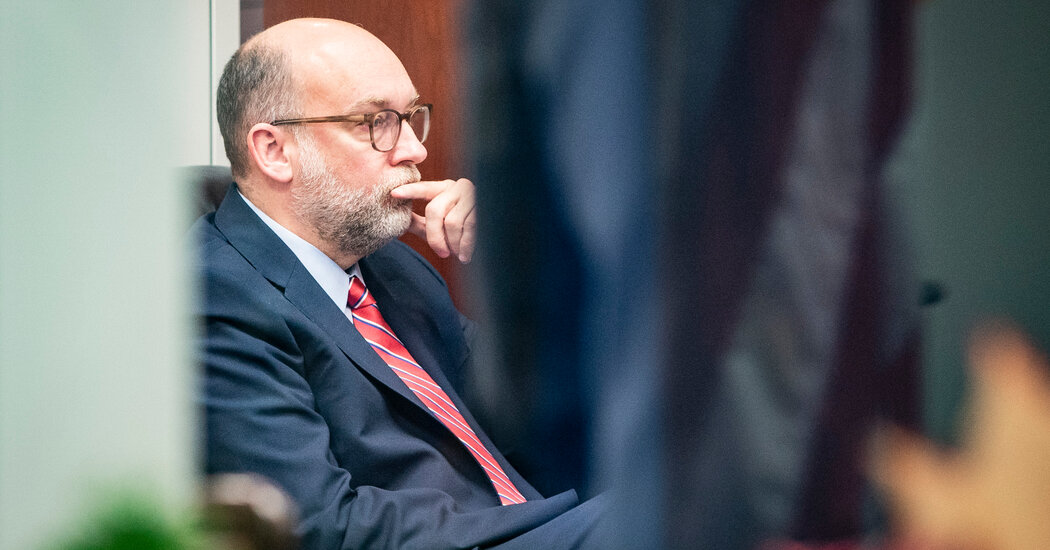In that role, Vought is determined to wipe out any vestiges of Democratic control of the United States government. In December 2022, he wrote that Democratic control had resulted in
the emergence of political prisoners, a weaponized, SWAT-swaggering F.B.I., the charges of “domestic terrorism” and “disinformation” in relation to adversaries’ exercise of free speech and the reality that the National Security Agency is running a surveillance state behind the protective curtain of “national security.” The immediate threat facing the nation is the fact that the people no longer govern the country; instead, the government itself is increasingly weaponized against the people it is meant to serve.
The protest over the killing of George Floyd, in Vought’s view, “obviously was not about race. It was about destabilizing the Trump administration,” part and parcel of “the left’s belief that structures in society are the problem. Pulling society down for purposes of revolution is exactly what they want.”
Perhaps the most effective tool for defanging the deep state, according to Vought, is the attack on job protections for the 50,000 federal workers who manage the details and enforce policy. Under the proposal, originally known as Schedule F — it has been renamed Schedule Policy/Career — President Trump would be free to fire anyone in this civil service category who does not comply with his orders.
Trump’s “roiling actions,” The Washington Post reported last week,
have generated workplace fear, confusion and anger — never good traits for any organization. The breathtaking scope and sudden implementation of his moves, some with dubious legality, stunned workers and citizens alike, as Trump tries to significantly and controversially expand the powers of the presidency.
Sarah Binder, a political scientist at George Washington University and a senior fellow in governance studies at Brookings, described by email the significance of Vought’s selection:
Trump’s appointment of Russell Vought as head of O.M.B. is enormously consequential. Think of O.M.B. as the “central nerve system” for the executive branch — developing the president’s budget, implementing and managing his policy priorities and existing government programs, and overseeing agency rule-making. That makes the O.M.B. director something like the orchestra conductor for the executive branch.
Vought is not just conducting an orchestra. Far from it! He is spearheading nothing less than an existential challenge to Congress’s core constitutional “power of the purse” — the authority to direct and control how federal funds are spent.
Despite Vought’s assault on this fundamental congressional prerogative, Senate Republicans are showing few, if any, doubts about Vought’s nomination to run O.M.B.
“He’s going to fly like green grass through a goose,” as Senator John Kennedy of Louisiana put it.
Stanley Feldman, a political scientist at Stony Brook University, emailed his response to my queries:
The broader audience for Vought’s invective is the substantial minority of Americans with authoritarian predispositions. Over the past 30 years, white authoritarians have become more consistently conservative on a wide range of issues — from immigration, to gender, to racial attitudes, to gay rights.
Feldman continued:
The villains in this right-wing account of American politics are liberals and Democrats. What is the “deep state” that Vought and his reactionary confederates want to crush? Anyone in government who is liberal, a Democrat, or who supports the liberal, Democratic agenda.
This reactionary agenda is not supported by a majority of Americans and not by all those who voted for Trump in November. But it does resonate with a large minority of the population (MAGA Republicans) who have come to believe that liberals and Democrats are an existential threat to the nation. Mobilizing those people has led to the capture of the Republican Party and, with Republican control of all branches of government, the ability to purge liberals and other public servants from the government and bureaucracy.
Largely agreeing with Feldman, Julie Wronski, a political scientist at the University of Mississippi, argued that “not all Americans feel this way, but a significant percentage does.” She cited poll data showing “that about 60 percent of partisans feel that members of the opposing party are a serious threat to the U.S. and its people, and about 40 percent think the opposing party is downright evil.”
Ryan Enos, a political scientist at Harvard, suggested in an email that the share of the electorate holding views similar to Trump, Vought and their allies is much smaller than others think:
Such beliefs are representative of a paranoid anti-government fringe that has never enjoyed widespread support. Until recently, such attitudes would be disqualifying for any high-level government official.
Trump, “in order to rationalize his own crimes and corruption,” Enos contended in his email, “has constructed a series of beliefs in which a ‘weaponized’ government pursues innocent citizens for political reasons.”




